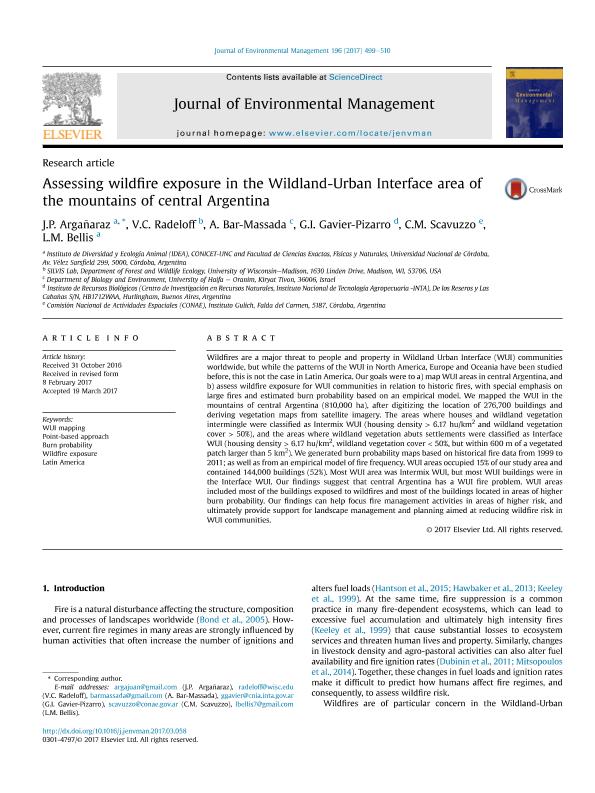Mostrar el registro sencillo del ítem
dc.contributor.author
Argañaraz, Juan Pablo

dc.contributor.author
Radeloff, Volker

dc.contributor.author
Bar Massada, A.
dc.contributor.author
Gavier Pizarro, Gregorio

dc.contributor.author
Scavuzzo, Carlos Marcelo

dc.contributor.author
Bellis, Laura Marisa

dc.date.available
2018-11-12T19:23:11Z
dc.date.issued
2017-07-01
dc.identifier.citation
Argañaraz, Juan Pablo; Radeloff, Volker; Bar Massada, A.; Gavier Pizarro, Gregorio; Scavuzzo, Carlos Marcelo; et al.; Assessing wildfire exposure in the Wildland-Urban Interface area of the mountains of central Argentina; Academic Press Ltd - Elsevier Science Ltd; Journal of Environmental Management; 196; 1-7-2017; 499-510
dc.identifier.issn
0301-4797
dc.identifier.uri
http://hdl.handle.net/11336/64276
dc.description.abstract
Wildfires are a major threat to people and property in Wildland Urban Interface (WUI) communities worldwide, but while the patterns of the WUI in North America, Europe and Oceania have been studied before, this is not the case in Latin America. Our goals were to a) map WUI areas in central Argentina, and b) assess wildfire exposure for WUI communities in relation to historic fires, with special emphasis on large fires and estimated burn probability based on an empirical model. We mapped the WUI in the mountains of central Argentina (810,000 ha), after digitizing the location of 276,700 buildings and deriving vegetation maps from satellite imagery. The areas where houses and wildland vegetation intermingle were classified as Intermix WUI (housing density > 6.17 hu/km2 and wildland vegetation cover > 50%), and the areas where wildland vegetation abuts settlements were classified as Interface WUI (housing density > 6.17 hu/km2, wildland vegetation cover < 50%, but within 600 m of a vegetated patch larger than 5 km2). We generated burn probability maps based on historical fire data from 1999 to 2011; as well as from an empirical model of fire frequency. WUI areas occupied 15% of our study area and contained 144,000 buildings (52%). Most WUI area was Intermix WUI, but most WUI buildings were in the Interface WUI. Our findings suggest that central Argentina has a WUI fire problem. WUI areas included most of the buildings exposed to wildfires and most of the buildings located in areas of higher burn probability. Our findings can help focus fire management activities in areas of higher risk, and ultimately provide support for landscape management and planning aimed at reducing wildfire risk in WUI communities.
dc.format
application/pdf
dc.language.iso
eng
dc.publisher
Academic Press Ltd - Elsevier Science Ltd

dc.rights
info:eu-repo/semantics/openAccess
dc.rights.uri
https://creativecommons.org/licenses/by-nc-nd/2.5/ar/
dc.subject
Burn Probability
dc.subject
Latin America
dc.subject
Point-Based Approach
dc.subject
Wildfire Exposure
dc.subject
Wui Mapping
dc.subject.classification
Ciencias Medioambientales

dc.subject.classification
Ciencias de la Tierra y relacionadas con el Medio Ambiente

dc.subject.classification
CIENCIAS NATURALES Y EXACTAS

dc.title
Assessing wildfire exposure in the Wildland-Urban Interface area of the mountains of central Argentina
dc.type
info:eu-repo/semantics/article
dc.type
info:ar-repo/semantics/artículo
dc.type
info:eu-repo/semantics/publishedVersion
dc.date.updated
2018-10-19T20:41:54Z
dc.identifier.eissn
1095-8630
dc.journal.volume
196
dc.journal.pagination
499-510
dc.journal.pais
Estados Unidos

dc.description.fil
Fil: Argañaraz, Juan Pablo. Consejo Nacional de Investigaciones Científicas y Técnicas. Centro Científico Tecnológico Conicet - Córdoba. Instituto de Diversidad y Ecología Animal. Universidad Nacional de Córdoba. Facultad de Ciencias Exactas Físicas y Naturales. Instituto de Diversidad y Ecología Animal; Argentina
dc.description.fil
Fil: Radeloff, Volker. University of Wisconsin; Estados Unidos
dc.description.fil
Fil: Bar Massada, A.. University of Haifa; Israel
dc.description.fil
Fil: Gavier Pizarro, Gregorio. Instituto Nacional de Tecnología Agropecuaria. Centro de Investigación de Recursos Naturales. Instituto de Recursos Biológicos; Argentina. Consejo Nacional de Investigaciones Científicas y Técnicas; Argentina
dc.description.fil
Fil: Scavuzzo, Carlos Marcelo. Comision Nacional de Actividades Espaciales; Argentina. Consejo Nacional de Investigaciones Científicas y Técnicas; Argentina
dc.description.fil
Fil: Bellis, Laura Marisa. Consejo Nacional de Investigaciones Científicas y Técnicas. Centro Científico Tecnológico Conicet - Córdoba. Instituto de Diversidad y Ecología Animal. Universidad Nacional de Córdoba. Facultad de Ciencias Exactas Físicas y Naturales. Instituto de Diversidad y Ecología Animal; Argentina
dc.journal.title
Journal of Environmental Management

dc.relation.alternativeid
info:eu-repo/semantics/altIdentifier/url/https://www.sciencedirect.com/science/article/pii/S0301479717302736
dc.relation.alternativeid
info:eu-repo/semantics/altIdentifier/doi/https://doi.org/10.1016/j.jenvman.2017.03.058
Archivos asociados
